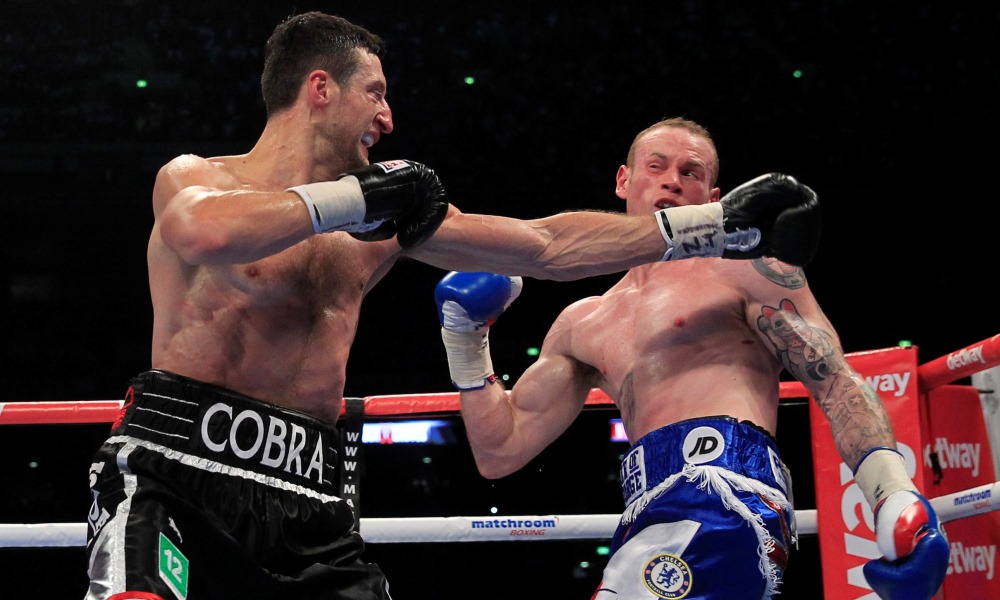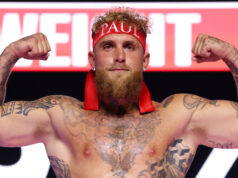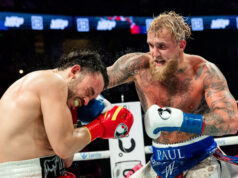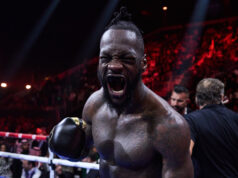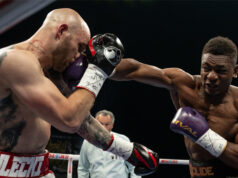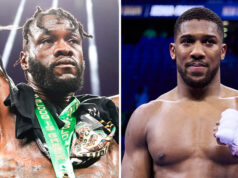The 2014 Boxing World Cup kicks off with a look at a nation which perhaps has stronger historical ties to the sport than any other , and retains one of the most fervent fan bases. Here’s a look at Great Britain, and after a poor English showing in Brazil they will be hoping that, along with the Scottish and Welsh, they can lift the country with some support here.
Today’s Fighters
If you were to produce a heat map of British boxing activity at world level, it would probably be at its hottest around the heavyweight, super middleweight and bantamweight divisions.
Amongst the largest behemoths, Britain can boast of contenders Tyson Fury and Dereck Chisora, as well as injured but returning veteran David Haye and David Price. At 168 pounds, Carl Froch is arguably the finest divisional “number two” of all the weight classes, while James DeGale and George Groves are an impressive pair of contenders. Further down the weights at bantam, alphabet world titles have changed hands between Jamie McDonnell, Stuart Hall and Paul Butler.
Elsewhere, Scott Quigg holds an alphabet belt at super bantam, while Ola Afolabi, Martin Murray, Amir Khan and Kell Brook are classy contenders. To round off, Tony Bellew, Nathan Cleverly, Billy Joe Saunders, Frankie Gavin, Ricky Burns, Anthony Crolla, Kevin Mitchell, Lee Selby and Kid Galahad make up an impressive list of former titlists, challengers and up and comers.
Points: 3/5
Fans and Venues
British boxing fandom tends to waver depending on the quality of fight in front of them. Generally, spikes in interest are built around the attraction of the ‘casual’ fan – those that tend to hover in and out of the sport, gleefully lapping up the big name fights but rejecting lesser events. A prime example of this is Carl Froch and George Groves’ recent rematch, which took place at Wembley (the English national football stadium), where tickets were sold almost as soon as they had been released, leading to a live audience of around 80,000. This level of support for one fight is virtually unprecedented in British boxing, and potentially indicates a resurgence of interest in the sport.
There will always be a generous portion of hardcore boxing fanatics seen at small-hall shows, and a wealth of knowledgeable fans, but generally boxing tends to fall behind other sports such as football, rugby and cricket.
The venues range in size, but the atmosphere provided by a British boxing public is hard to equal. York Hall is an excellent and historic venue, capable of producing a great atmosphere. Larger venues such as the O2 Arena, the Copper Box and the Excel Arena in London are often used for bigger name bills, whilst the Capital FM Arena, Olympia and the Phones4U Arena garner good attendances and fervent noise from their local support in Nottingham, Liverpool and Manchester respectively.
Points: 5/5
Amateur System
London hosted the 2012 Olympics amidst a wave of sudden passion for the games. This no doubt played a part as the crowd roared Great Britain’s boxing team to three gold medals (Anthony Joshua – heavyweight, Luke Campbell – bantamweight, Nicola Adams – flyweight), as well as one silver (Fred Evans – welterweight) and one bronze (Anthony Ogogo – middleweight). This high standard is one that has been cultivated and maintained throughout the years, with Britain standing behind only the USA and Cuba in overall Olympic boxing medals.
England, Scotland and Wales have tended not to be so successful at World Championships, but a quality domestic amateur program continues, while its hard to imagine British boxing going too far wrong with experienced trainer Rob McCracken as its ‘performance director’.
Points: 3/5
Professional System
The support network for professional boxers based in Britain is ably boosted by the presence of experienced, high-standard trainers, many with proven track records of success.
The Ingle gym is probably the one best known for producing a specific ‘style’ of boxer – often involving switch-hitting, elusiveness and hand speed. This has led to great success in the past, most notoriously with Nasseem Hamed but also with Herol Graham and Junior Witter. Currently, Kell Brook and Kid Galahad are the finest exponents of this style.
Tony Borg and Gary Lockett are currently leading a Welsh revival, whilst Scotland’s Billy Nelson must be credited for getting the best out of Ricky Burns.
Rob McCracken has successfully guided Carl Froch through his sterling professional career whilst Adam Booth has earned plaudits working the corners of both David Haye and George Groves in the past.
Joe Gallagher is blessed with a gym of great repute, with the likes of Quigg, Crolla and the Smith brothers honing their craft there. Gallagher has in the past been labelled ‘one-dimensional’ for producing fighters with similarly straightforward, aggressive styles, but this has been proven incorrect many times of late, most notably with the transformation and improvement of Crolla.
There are more worthy of mention here, though it’s clear from the above that Britain has a fine collection of professional trainers.
Points: 4/5
History & Significance
An Englishman; Jack Broughton, was responsible for laying down the first official boxing rules, while a Scotsman; John Douglas later gave life to the Marquess of Queensberry rules – a code that stands to this day. As a result, the British boxing community played an integral part in shaping the sport into what we know and love today.
Nowadays, boxing does not have the support of terrestrial television channels in Britain and can often find itself shunned by the mainstream media. Boxing nonetheless garners considerable and consistent support through other channels.
Britain has also been the home of many fine fighters in the past from Welshmen Jimmy Wilde, Howard Winstone and Joe Calzaghe, Scots Benny Lynch and Ken Buchanan through to Englishmen such as Bob Fitzsimmons, Randy Turpin, and the Lewis’ – Ted and Lennox.
Points: 4/5
Number of ProBoxing-Fans.com Top 20 Pound for Pound
Carl Froch stands tall above the rest in British boxing, currently sitting at 7th in our pound for pound list. There is no other Brit to be seen in our top twenty, meaning Froch is Britain’s only pound for pound point scorer.
Bonus Points: 2
Overall Boxing World Cup Score for Great Britain: 21 Points


